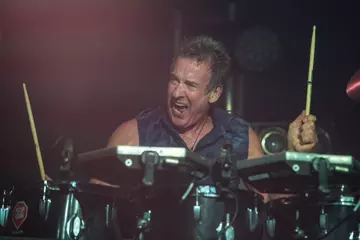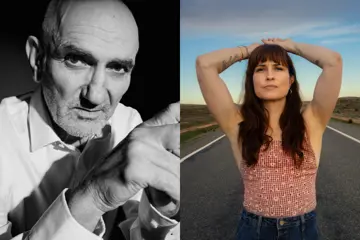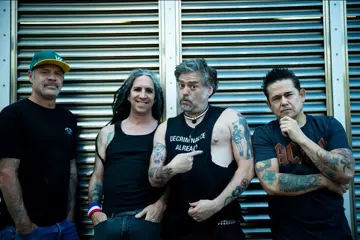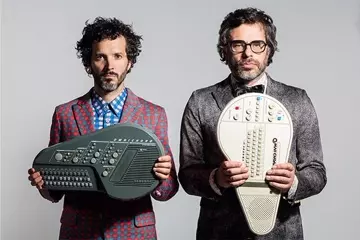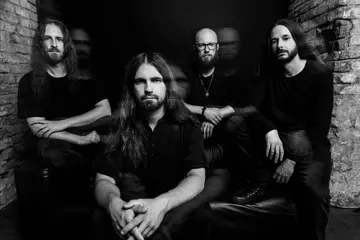It's hard to come out and straight-up recommend Cloud Atlas, but it's almost impossible not to. It's a wildly uneven, borderline ridiculous, CGI-amok, new-agey hymnal to the triumph of the human will told across centuries and genres that suffers from a terrible stylistic decision to have its central cast play recurring roles through separate stories. And yet for anyone remotely fond of cinematic daring, of ridiculous ambition, of big dreams writ across big screens, Cloud Atlas feels a lot like the motion-picture event of the year; the fact that it's generally considered a failure - as piece of storytelling art, and, well, if you actually care about this stuff, as box office entity - anything but a fatal condition.
The film is the three-hour, three-director attempt - by the Wachowskis and Tom Tykwer - to turn David Mitchell's mammoth novel, Cloud Atlas, into a movie. It's the kind of undertaking you can barely believe they tried: the whole appeal of Mitchell's novel isn't something tried and true like plot, but the way the words look on the page; the English novelist mimicking languages past and inventing languages future, effectively studying the power of vernacular as he, for example, imagines a dystopian, totalitarian future-Seoul set deep into the 22nd century. The six nesting stories are connected in various implicit or minor ways, narrative-wise; Mitchell seeing the true connection running along the book's greater themes, which alight on the recurring spectre of oppression; human history as a battle between those who cruelly yoke the weaker, and the virtuous romantics who strive to fight against the species' status quo.
It's the kind of novel - a work of vast imagination of specific vocabulary - that, when reading it, never suggests a to-screen adaptation. Upon hearing the news that the Wachowski/Tykwer trio was attempting to, it almost seemed like a failure before it began; an undertaking of some kind of lunacy that would, at best, flatten the magic of the novel, at worst, became a sodden mess. When early promotion for the picture actually took that most inert theme of the post-Short-Cuts ensemble-movie realm - We're All Connected! - and turned it into a straight-up tagline, it suggested a depressing future; some kind of Haggisian world of facepalming contrivance and broadside theme and greeting-card profundity.
Yet, watching the finished thing - this gargantuan cinematic monstrosity - it's hard to deny the dizzying ambition: how many films attempt to survey the very nature of man, across a millennia, across language and culture? How many pictures play as an old-fashioned matinée whilst pirouetting scattershot through manically-edited, postmodernist mosaic of genre? In an individualist, solipsistic, alienated age, how many times do you see a film take a telescopic look at the human timeline; and attempt to view the similarities between life in the 19th and 24th centuries?
Don't miss a beat with our FREE daily newsletter
Trying to synopsise Cloud Atlas is its own kind of folly, but, basically: a lawyer (Jim Sturgess) is a poisoned by a doctor (Tom Hanks) on a 19th century ship on a pan-Pacific trip; a penniless amanuensis (Ben Wishaw) gloms onto a syphilitic composer (Jim Broadbent) in 1930s Scotland; a nosy reporter (Halle Berry) seeks to uncover a nuclear conspiracy in 1970s San Francisco; a present-day publisher (Broadbent again) falls into an absurdist comic descent that ends at a hellish nursing home; a cloned fast-food server (Doona Bae) subverts the order of her totalitarian capitalist state in 22nd century Seoul; and a villager in a primitive, tropical post-apocalyptic society (Hanks again) struggles to fight off the devil in his ear (Hugo Weaving).
This is the boiled-down reduction; but know there is much going on in each narrative, with the principle cast playing recurring roles throughout. This idea was seen as being the great revelation for the filmmakers - the way they could have notions of essential transmigration 'make sense' to popcorn audiences - but it's, at best, problematic. World cinema's greatest proponent of narrative transmigration, Apichatpong Weerasethakul, has made, essentially, a whole career out of similar conceits; but where he makes them into formalist games - Tropical Malady a film that reincarnates itself; Syndromes And A Century telling the same story with the same actors in two separate time periods; Uncle Boonmee Who Can Recall His Past Lives changing genre as it changes reels as it peels back into past lives - there's nothing quite so thoughtful or elegant here. Instead, there's a kind of digital mask-creating that moulds the actors into all manner of odd shapes. Though Hanks - save for a pair of bad buck teeth in the Pacific crossing - largely stays heroically him; Bae is turned both freckle-faced/red-haired and into a Mexican cleaning-woman; Berry into a tragic European Jewess with a Nicole-Kidman-in-The-Hours beak; Weaving into a Ratched-esque nurse, a Korean heavy, and a Beetlejuice-ish devil dancin' a jig in a tophat and KISS facepaint; etc. Whilst the standard cries of 'Blackface!' or 'Yellowface!' came out in advance of the film, there's nothing so simple or sinister at play here. Instead, it's more just, like, weird; almost dipping into CGI's Uncanny Valley as faces are played with, and voices, in turn, grow a shade disembodied; the suspension-of-disbelief faltering when we wonder why this 19th century lawyer's wife in ol' Frisco has such a heavy Korean accent.
Aside from the disconcerting, dissonant dip whenever you see something bizarre - Hugh Grant as a marauding cannibal from a rival post-apocalyptic tribe, say; or Hanks bordering on Tom-Cruise-in-the-fat-suit as a foul-mouthed Irish author - all this endless parade of digitally-altered name actors does is bring constant attention to the artifice of the picture; not in some meta-commentary way, but one that makes you think, too much, of how it came to screen, how it probably would never have been made had not all these name actors signed on, and how maybe they'd never have signed on if they just had tiny one-off roles, rather than many varied ones. Befitting a film full of many varied roles in many varied stories, you often get the feeling that each is getting a short shrift; the individual narratives all enough to sustain entire standalone features. In some cases —as with the barmy modern-day comedy or the boilerplate '70s mystery - it matters not; but the two post-apocalyptic tales barely get to establish their vivid visions of the future, let alone have them explored. The future-Seoul section - which, in the book, is called An Orison Of Sonmi~451 - feels particularly shortchanged: on the page, Mitchell's writing is transcendent and beautiful and the stuff of delirious linguistic daydreams; on screen, it's a rushed yarn pushed towards action tropes, and rendered in garish collection of pixels that has the same video-gamey feel as the Wachowskis' much-detested Speed Racer adaptation.
Yet, there are plenty of moments where the writing shines through the CGI, when it transcends the digital rubberfacing of its cast, when it goes beyond all nominal notions of filmmaking folly and failed big-screen visions. Cloud Atlas was considered unadaptable - and its to-screen translation, to some, likely reasserts such a notion - but it's that very quality that makes the film rise above the tediousness that saps the life from most market-researched blockbusters, which have dollars by the truckload but ambition by the thimbleful. Mitchell's blueprint is the opposite of boilerplate; and the can't-believe-this-is-happening/can't-believe-they-made-this feeling of Cloud Atlas is, when taken in the context of other $100mil productions, something that should be embraced, not shunned.
Casa De Mi Padre is a parody of Mexican westerns and telenovelas, that sends Will Ferrell south of the border - en Español - for a suitably-wildly-melodramatic tale of rival narcotics syndicates, crooked cops, tragic backstories, and heaving passions; with brilliantly-pastiched musical numbers arising, periodically, in what amount to the movie's best moments. Ferrell is joined by breakout starlet Génesis Rodríguez, Nick Offerman, Efren Ramirez, and the ol' Y Tu Mamá También bros, Gael García Bernal and Diego Luna, and they all seem like they're having fun amidst what's, really, a goofball lark; a sketch-comedy conceit padded out to 80 minutes. Writer Andrew Steele comes from the Saturday Night Live/Funny Or Die stables, but he doesn't push things to a manic, Zucker-esque pace of constant gags; the funniest bits - Luna clutching a tumbler at all times, even when being riddled with bullets - more of gentle mirth that outright hilarity. Instead, Ferrell plays it straight and, for all its old-form pastiching and deliberately-cheap sets and bad modelled stop-motion and deliberately mismatched intercutting, the script often does, too; the joke being the form itself, not the content.
I Give It A Year imagines itself to be a savage skewering of the romantic-comedy, but, instead, it's rather just a variation on a theme. Here, Rose Byrne and Rafe Spall play a mismatched couple whose courtship plays out in an opening credit-roll of happy snapshots; the plot-proper opening at their wedding. Cue: 'hilarious' embarrassing speeches - from Stephen Merchant, horrendously unfunny - and the sense of imminent disaster looming; Minnie Driver immediately dismissing the nascent union by speaking the film's title aloud. And, so, this Year becomes the framing calendar for the story: four seasons of a failing marriage, the narrative put on the passing-of-time clock.
The inversion of genre tropes goes like this: the crowd is invited not to cheer for the couple to stay together, but to part; and, at times, there's fun to be had, with public declarations of non-commitment, a dramatic chase to the train-station to make that final pledge of divorce. But it's only an inversion, not a subversion; the old stock clichés turned upside-down, but still recognisable, still in use. Writer-director Dan Mazer - a longtime collaborateur with Sacha Baron Cohen - may make out like he's slaying the stereotypes, but, really, he's just recycling them; this feeling like just another Working Title rom-com, filled with all the same caricatures, same moments of comic embarrassment, same three act structure.
Given there's hardly a plum market for divorced-themed rom-coms, I Give It A Year will be compared, constantly, to Celeste & Jesse Forever, but where Rashida Jones and Will McCormick's script toyed with audience's wants, allowed the lines of separation to get blurry, and dared send its main couple off into an uncertain future, Mazer plays things way more safe. Audiences are only invited to cheer for the splitting of Byrne and Spall because, as much as they're mismatched, they have a perfect match waiting in the wings: Simon Baker and Anna Faris on hand to make sure there's not one but two couples kissing happily-ever-after on the big-pullaway-on-close.

